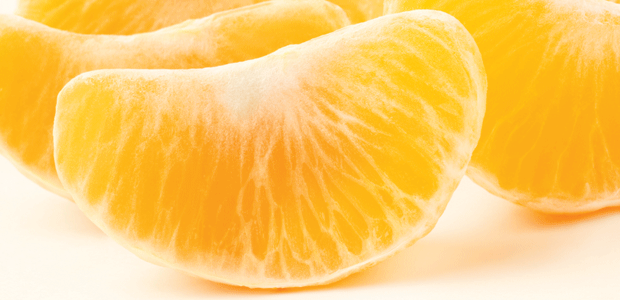Advertisement
Mandarin Appeal
The citrus with nutritional might

“Christmas oranges” that’s what many of us call the sweet, aromatic fruit otherwise known as mandarins. The childish term is not entirely inappropriate—mandarins have become as de rigueur during the festive season as shortbread. But, as recent studies suggest, mandarins are sweet treats we can indulge in with near impunity!
The term mandarin orange actually encompasses an entire group of citrus fruits, and the main varieties include satsuma, clementine, honey, and tangerine. In North America tangerines and mandarins are sometimes mistakenly referred to as the same fruit, but as noted, tangerines are actually a subgroup of mandarins.
Regardless of the variety, mandarins pack a nutritional wallop that is garnering much praise from the scientific community. Rich in vitamin C, the revered mandarin is also loaded with folate, potassium, vitamin A, and a bevy of disease-fighting antioxidants.
Antioxidant loaded
While vitamin C’s role as an impressive antioxidant has already been established, new research is shedding light on some lesser-known antioxidants that abound in mandarins.
A recent study at the University of Valencia demonstrated that hydroxycinnamic acids in mandarin juice significantly reduced the biomarkers for oxidative stress in children with high cholesterol and enhanced their overall antioxidant status.
Not surprisingly, Japanese researchers echoed these results when they found that diabetic rats given a steady intake of mandarin juice had raised levels of protective antioxidant enzymes in their livers. Some scientists are now suggesting that regular consumption of mandarins may act as a support against liver cell damage. The evidence is certainly compelling—another Japanese study showed that consuming mandarin juice could keep hepatitis-infected patients from developing liver cancer.
Beyond the liver
But mandarin’s health benefits extend beyond just being liver friendly. It seems this colourful little fruit can also help keep your lungs healthy. A study published in the September 2003 issue of Cancer, Epidemiology, Biomarkers and Prevention indicated that eating foods such as mandarins, which are high in the carotenoid beta-cryptoxanthin, could reduce your risk for developing lung cancer by 27 percent.
It’s all in the peel
News of the mandarin’s health-enhancing properties certainly wouldn’t surprise anyone from Asia. The fruit has been revered there for centuries. However, in the Far East the peel of the mandarin is as prized as the succulent segments of the juicy fruit. In traditional Chinese medicine, mandarin peel is used to regulate qi, enhance digestion, and reduce phlegm.
According to Victoria, BC, registered acupuncturist and nutritional microscopist MaryJane O’Byrne, mandarin peel or chen pi “acts on the spleen and lung channels and is invaluable for treating gastrointestinal problems like abdominal distension, anorexia, and diarrhea caused by stagnation in the spleen and stomach. It also expels dampness (toxins) from the body and oxygenates the blood,” she enthuses.
PMFs to the rescue
Now Western medicine concurs with this ancient practice. According to a study published in the Journal of Agriculture and Food Chemistry, a class of compounds in citrus peel called polymethoxylated flavones (PMFs) has the potential to lower cholesterol and blood pressure as effectively as prescription drugs—without the side effects. In addition, PMFs has been shown to inhibit growth and induce apoptosis (death) in breast and lung cancer cells and inhibit growth in colon cancer cells.
The peel of mandarins is particularly rich in PMFs so grating a tablespoon of the peel from a well-scrubbed mandarin and using it to flavour oatmeal, soups, salad dressings, or rice may be a practical and easy way to benefit your health!
However, to make sure you’re truly reaping health benefits it’s best to use organic mandarins. Most commercially grown citrus fruits have pesticide residues on their skin and may be artificially coloured because they are picked before ripened. For optimum flavour and nutrition, nothing surpasses an organic tree-ripened mandarin.
Stored in a cool dry place, these Christmas oranges will keep two to three weeks—as long as you can keep them away from the kids!
Recipes




